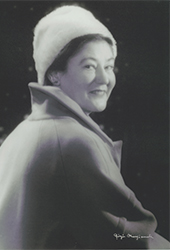Oriel Gray (1920-2003)

Oriel Gray (nee: Oriel Holland Bennett) was an Australian playwright, author and film and television writer.
She was born on 26th March 1920 in Belmore, Sydney.
Early life and family
Oriel’s paternal grandfather was proprietor of The Burragong Argus and The Young Witness newspapers in rural NSW. After his death, her grandmother retained an interest in the papers and played an active role in publishing The Young Argus.
On her mothers side was Irish rebel patriarch John Sheehan. Sheehan arrived as a convict to Australia in 1805, his death sentence was commuted to transportation for life. Sheehan married fellow convict Anne Twomey and the couple lived in Jugiong, NSW. To quote Oriel, ‘the family owned hotels, and certainly frequented them’.
Oriel’s father, Benjamin Bennett worked as journalist and later editor of The Young Witness newspaper. He represented the seat of Werriwa on behalf of the Australian Labor Party for a short term and later worked in the public service. His strong beliefs in ‘traditional Labor values’ and social justice were passed on to his daughter.
After her mother Ida May Sheehan died of pneumonia in 1926, Oriel was largely raised by her older sister, Grayce.
New Theatre and the Communist Party
In an age of smaller amateur and semi-pro theatres, Grayce’s ambitions as an actress led them from Mr Harry Thomas’ ‘Kursal Theatre’ to ‘New Theatre’ in Pitt Street. New Theatre was a cultural arm of the Communist Party of Australia (CPA) with a stated credo of ‘plays with a purpose’.
Oriel’s first experience at New Theatre, a performance of Irwin Shaw’s Bury The Dead, proved a transformative one. She joined as crew member and front of house, graduating to performing and eventually, writing. Oriel became the first New Theatre, and possibly Australian, ‘writer in residence’.
The sisters lived in an old rooming house in Gloucester St, The Rocks. Formerly The Ship and Mermaid Inn it was a haunt of artists and bohemians, known affectionately to residents as ‘Buggery Barn’.
Oriel blossomed as a writer and wrote spots for CPA’s regular radio show. She showed a comic flair with her political revues like Marx of Time and Let’s Be Offensive. Oriel’s first serious stage play Lawson, opened to great acclaim. It became a New Theatre staple with productions in several Australian cities.
Oriel married actor John Gray and had a son, Stephen. She remained living in close contact with Grayce and her husband, John Hepworth. Oriel’s marriage to Gray lasted several years. However, much to the disapproval of Party officials and her sister, Oriel later formed a long term relationship with Hepworth.
Abandoning the Party, the Oriel and Hepworth moved to Lismore then Newcastle, eventually settling in Melbourne. The couple had two sons, Peter and Nicholas.
Later work
During the early 1950s, Oriel continued to write for the stage. Her 1955 play, The Torrents, shared the Playwrights Advisory Board prize with Ray Lawler’s Summer of the Seventeenth Doll. In 1959, Burst of Summer, a play about racial tensions in a small country town, won the J. C. Williamson prize.
Perhaps disillusioned by the lack of success of her stage work, Oriel became increasingly interested in television and film. She wrote several stand-alone television dramas, held a position as a writing team member on the popular serial ‘Bellbird’ and continued to write for radio.
Amongst Oriel’s later projects was Exit Left. Her autobiography covered life in Sydney during the war; the power and camaraderie of live theatre; and her often fractious association with the Australian Communist Party and writer, John Hepworth. The Animal Shop, a novel revolving around women living in a Housing Commission estate, was also published in 1990.
Oriel’s last produced work was a short play, Joan and the Errant Soul for Sydney’s Belvoir Theatre in 1997.
Death
Oriel died at home on 30th June 2003 surrounded by her family, including Coco, the last in a long line of much-loved feline companions.
Information sourced from:
The Hepworth Family
Exit Left by Oriel Gray
New Theatre Wikipedia